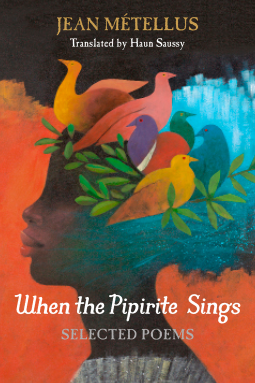
When the Pipirite Sings
Selected Poems
by Jean Métellus
This title was previously available on NetGalley and is now archived.
Send NetGalley books directly to your Kindle or Kindle app
1
To read on a Kindle or Kindle app, please add kindle@netgalley.com as an approved email address to receive files in your Amazon account. Click here for step-by-step instructions.
2
Also find your Kindle email address within your Amazon account, and enter it here.
Pub Date Apr 15 2019 | Archive Date Jun 10 2019
Talking about this book? Use #WhenThePipiriteSings #NetGalley. More hashtag tips!
Description
Translated by formidable comparative literature scholar Haun Saussy, When the Pipirite Sings expresses an acute historical consciousness and engages recurrent Haitian themes—the wrenching impact of colonialism and underdevelopment, the purposes of education, and the merging of spiritual and temporal power. And, as always with Métellus’s poetry, the range of voices and points of view evokes other genres, including fiction and cinema. This eminently readable book has formal and thematic ties to Aimé Césaire’s Notebook of a Return to the Native Land, central to the canon of French-language postcolonial writings.
In addition to many books of poetry, Métellus published novels, chiefly about the remembered Haiti of his youth, and plays about the conquest of the Caribbean. His nonfiction included reflections on Haitian history and politics, on the iconography of slave emancipation, and studies of aphasia and dyslexia.
Advance Praise
“Jean Métellus’s strikingly original voice is finally available in a splendid translation that captures the epic sweep and tragic thrust of his hallucinatory style. Haun Saussy renders with subtle poetic nuances the poet’s engagement with Haiti’s mythic gods, its landscapes and natural disasters, and the heartbreaking fate of its children. It will now be possible to teach Métellus in world literature courses, alongside Homer, Aimé Césaire, René Depestre, or Derek Wolcott, and appreciate anew his remarkable talent and singular vision.” —Françoise Lionnet, author of Postcolonial Representations: Women, Literature, Identity
“Saussy’s translation remarkably preserves Métellus’s poetic imagination and the Haitian matrix in which his entire literary work is inscribed. It skillfully transfers into English the coalescence of the poet’s native land with the universal, the deliberate language turbulence, the ‘thought-rhythm-images’ association, the words’ effervescence, and the sparkling images of Metellus’s poetic language.” —Elisabeth Mudimbe-Boyi, Professor Emerita of French and Comparative Literature, Stanford University
"That Haun Saussy has translated Métellus's complex and discursive Haitian Francophone original into a solid English is a feat worthy of note. That this first poetic work of the prolific Jean Métellus will be known to scholars and students of Haitian literature through a new translation is equally notable and should be celebrated." —Danielle Legros Georges, Poet Laureate, City of Boston
"Haiti’s contributions to literature have thus far been scanted in the English-speaking world. Jean Métellus, physician-poet, has remained obscure to those who might read Rimbaud or Valéry. This is all about to change through this book, the expression of both Métellus’s and Saussy’s love for Haiti. When the Pipirite Sings should remain a standard-setting effort in the broader project of translating an increasingly disparate world." —Paul Farmer
Available Editions
| EDITION | Other Format |
| ISBN | 9780810139787 |
| PRICE | $18.95 (USD) |
| PAGES | 104 |
Featured Reviews
 Joseph S, Reviewer
Joseph S, Reviewer
ean Métellus was born in Haiti and initially educated in Haiti. He left his home country to continue his education and escape the Duvalier regime in 1959. In Paris, he studied linguistics and neurology. Metellus would not return to his homeland, but instead, he began to write poetry about Haiti. His attachment to Haiti is complex since he wrote about it from memory, perhaps a bit idealized, and wrote in French, not in Creole. Haun Saussy translation of the French to English captures the spirit of the poetry while keeping the form intact.
Metellus' masterpiece "When the Pipirite Sings" opens the collection. There is an immediate feeling of the countries people and history. The slave labor and broken promises of freedom and prosperity run through the poem as well as the forced language and religion on a captive people.
When the pipirite sings the Haitian peasant has already crossed the day’s
threshold and forms in the air, one step behind the sun, the outline of a
crucified man embracing life
...
The Haitian peasant knows how to get up before dawn and bury a wish, a
dream
Poverty and slash and burn subsistence agriculture is represented.
Before daybreak this mother was contemplating
Her womb more fertile than the earth
~ When the Pipirite Sings
Glimmers of hope grow in other poems.
Haiti is glowing like a cat
Her breath and her rapture spread abroad
Her men and hillsides are already singing
Cinnamon and spices play
The seasons will cover our fields with flowers
~The Sun's Reply
Metellus captures the spirit of his homeland and its roots. Themes of slavery and African heritage, poverty, simple lives, and hope for Haiti run deep in all the poems.
April 15, 2019


















